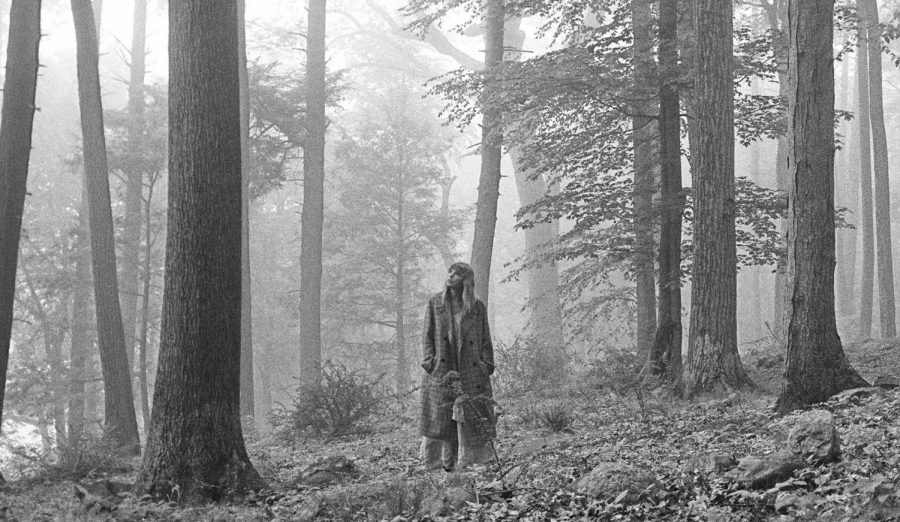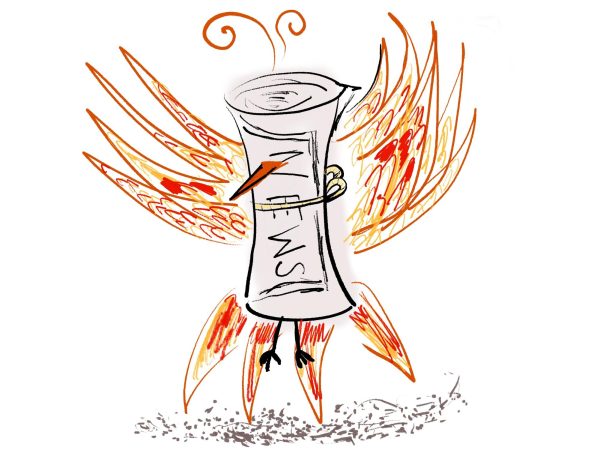Taylor Swift’s folklore: An Album Review and Exploration
On a Thursday morning at the end of July, pop superstar Taylor Swift took to Instagram to announce that her eighth studio album, folklore, would be dropping less than 24 hours later. “Most of the things I had planned this summer didn’t end up happening, but there is something I hadn’t planned on that DID happen,” she captioned the post. “Surprise.”
Swift wrote and recorded all 16 songs on the record during these months of quarantine. A decided pivot from the synth-soaked pop of her previous three albums 1989 (2014), reputation (2017), and Lover (2019), folklore is an indie-alternative album made of storytelling, layered characters, and the breadth of human emotions tied up in loss and love. It’s her most mature album to date, both sonically and lyrically, and was created largely in collaboration with The National’s Aaron Dressler.
folklore wasn’t written for the radio or with goals of topping the Billboard charts in mind—it comes across as Swift’s most honest work because it is. “In isolation my imagination has run wild and this album is the result, a collection of songs and stories that flowed like a stream of consciousness,” she wrote in another post on the eve of the album’s release. “I’ve told these stories to the best of my ability with all the love, wonder, and whimsy they deserve. Now it’s up to you to pass them down.”
…
She opens the album with “the 1”, which is as strong a beginning track as they come. About half of the songs on folklore follow the perspective of a cast of fictional characters Swift created for the album, but along with a few others, “the 1” draws from her own life. It opens the record with a plucky yet contemplative look back at a failed relationship from years past where she asks, ‘what could have happened if every star had aligned?’ She reminisces but doesn’t yearn, singing in the chorus, “We were something don’t you think so? / Roaring twenties, tossing pennies in the pool / and if my wishes came true / it would’ve been you.”
That one-that-got-away storyline finds a resolution of sorts in “invisible string,” another track personal to Swift’s own life. In this song, she flirts with the idea that there was always an invisible string tying her to her soulmate, one that pulled her “out of all the wrong arms” and “wrapped all [her] past mistakes in barbed wire.” It’s sweet and smart and rose-coloured, and it’s a clear reflection of the contentment Swift feels in her current relationship with actor Joe Alwyn.
In “peace” and “hoax,” the final two songs on folklore, she speaks to the maturation of this relationship. Love isn’t just destiny and magic anymore; it’s wrestling with her private flaws and the struggles of Swift’s stardom. “I’d give you my sunshine, give you my best, but the rain is always gonna come if you’re standing with me,” she sings. “Would it be enough if I could never give you peace?”
…
The candor and rawness with which Swift goes about her lyricism is her greatest strength, and with folklore she leans into it completely. Take “seven,” an ode to lost innocence and a childhood best friend, or “the last great american dynasty,” which tells Rebekah Harkness’ story, who owned Swift’s Rhode Island mansion before she did. “epiphany,” a slow and atmospheric track that in comparison to others, isn’t a standout on the album, compares her grandfather’s time in the military to the confusion and tragedy of life in a pandemic. This kind of narrative storytelling is exactly in Swift’s wheelhouse. It shines in some of her best songs of years past: “All Too Well,” “Last Kiss,” “Cornelia Street,” “Love Story.”
Swift had been under Hollywood’s unforgiving microscope through the majority of her formative years. She’s been painted in the media to be America’s young sweetheart, then a shallow, lovestruck teenager, then a snake during a public feud with Kanye West and Kim Kardashian. These are the experiences Swift drew from to pen the haunting track “mirrorball” where she likens herself to a disco ball—mirrors on every surface. She’ll put on her best, brightest face just for you to enjoy, but when she “breaks it’s in a million pieces.” The lyrics are haunting but the production layered and dreamy, paralleling the shiny exterior Swift says she puts on for the world.
In “my tears ricochet” and “mad woman,” Swift returns again to trauma she’s faced in the music industry. “my tears ricochet” in particular is widely speculated to be about this, specifically addressing her fight to buy back the masters of her first five albums from her former record label, Big Machine Records. “I didn’t have it in myself to go with grace,” she admits in the chorus. She carries this sentiment to folklore’s twelfth track, “mad woman,” though that lacks the same emotional gut-punch.
…
Perhaps the crowning jewel of folklore is a trio of songs Swift likes to refer to as the Teenage Love Triangle. “cardigan,” “august,” and “betty,”—tracks 2, 8, and 14 respectively—center around the characters James and Betty, who were in a relationship until James cheated on Betty and spent the summer with an unnamed girl. Each song is told from the perspective of one of the three: “cardigan” from Betty’s, “august” from the unnamed girl’s, and “betty” from James’. “One thing I did purposely on this album was put the Easter eggs in the lyrics, more than just the [music] videos,” said Swift in a YouTube Q&A. “I created character arcs & recurring themes that map out who is singing about who.”
“cardigan” is the first in the trilogy chronologically. It’s a heartbreaking and mature portrait of teenage love where Betty reflects on moments from her relationship with James before the summer affair happened. With each chorus, these memories become more painful, beginning with the two dancing drunk under a streetlight and ending with James leaving her to remember all this, alone.
In “cardigan,” Swift draws an artful comparison to Peter and Wendy from J.M. Barrie’s Peter Pan, where Peter wanted Wendy to stay on Neverland with him where nobody grows old but Wendy knew she had to return to reality. In the frame of this metaphor, Wendy is Betty and Peter is James. The allusion reinforces the distance Betty illustrates between youthful affection and long-lasting love; James’s mindset falls into the former and Betty’s the latter.
Holding on to youth and the refusal to let go of what you know are themes Swift carries through the ‘triangle.’ Her characterization of time shows it as a constant, inevitable pressure, especially clear in the unnamed other girl’s perspective in “august.” It’s possible that the choice to leave this song’s narrator unnamed—unlike Betty and James—was in order to keep the blame for infidelity and narrative focused on James rather than the other girl. Perhaps it’s because Betty and James, caught up in their own feelings, reduced her personhood and feelings to just being ‘the other woman.’ The beauty of Swift’s imaginative storytelling—and the nature of folktales, really—is its freedom for interpretation.
“august” is a cornerstone of folklore, one of Swift’s most impressive efforts on the record. Her longtime collaborator Jack Antonoff cited it as one of his favorite songs he and Swift have ever put out. It narrates the summer James and the unnamed girl spent together, sun-drenched and fleeting. It’s easy to imagine the two in an open field in late summertime, a golden haze cast over the scene. “I can see us twisting in bedsheets, August slipped away like a bottle of wine,” she sings, “cause you were never mine.” The girl knows James wasn’t hers to lose but can’t help her feelings anyway. Swift couples the naivety of teenage love with the self-aware and painfully adult sensation of realizing self-sabotage as it’s going on: “Back when we were still changing for the better / wanting was enough, for me it was enough / to live for the hope of it all.” God, she’s good.
Some fans theorize that “illicit affairs,” a poignant track about the aftermath of infidelity, falls into their storyline as well. The song deals with the moral wrongdoing in the act but addresses it with nuance, recognizing the thrills and highs as well as the pain one experiences themselves as the situation comes crashing down. While it could be just a stand-alone track, it could fit the unnamed girl’s emotions toward James once she gets over their relationship and realizes the position James put her in. “You taught me a secret language I can’t speak with anyone else,” she sings, and it aches. “And you know damn well, for you I would ruin myself a million little times.”
And finally, the love triangle wraps up with “betty,” where James comes to Betty, explains himself, and asks for her back. The song’s production is guitar- and harmonica-driven, a more upbeat country song reminiscent of her first two albums, and perhaps the contrast between “betty” and the heavy and dark “cardigan” speaks to the difference in Betty’s and James’ understanding of love yet again. In “cardigan” she says she “knew everything when [she] was young,” but in “betty” James pleads, “I’m only seventeen, I don’t know anything.”
Throughout the record, Swift’s production feels like a complementary tool to her storytelling rather than being the selling point of each song—the echo-like vocals in “this is me trying” that mimic a spinning head; a key change in “betty” to signify the narrator regaining hope; Swift and featured artist Bon Iver singing over each other in “exile” like two ex-lovers whose relationship fell apart because they couldn’t listen to each other. Each choice is conscientious and contributes to the lovely wholeness of folklore as an album.
folklore felt like a familiar record upon first listen, and likely because it capitalized on what Swift had been doing with her music from the start. She tells stories and falls in love, romanticizes the past and then passes it on. It’s a glittering album for cloudy days and a cozy blanket, and it might be the best she’s created—yet.

Sariah Hossain is a senior and The Tower's Co-Editor-in-Chief. This is her fourth year on the publication and, as her friends can all attest, writing...







